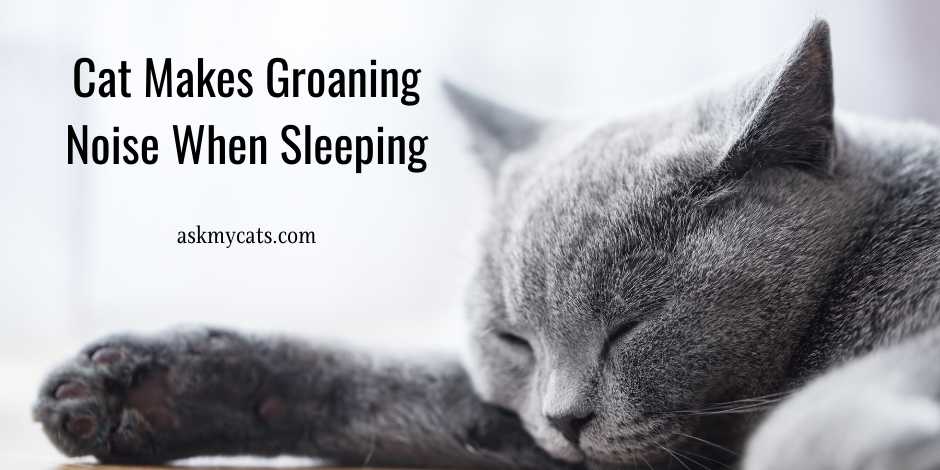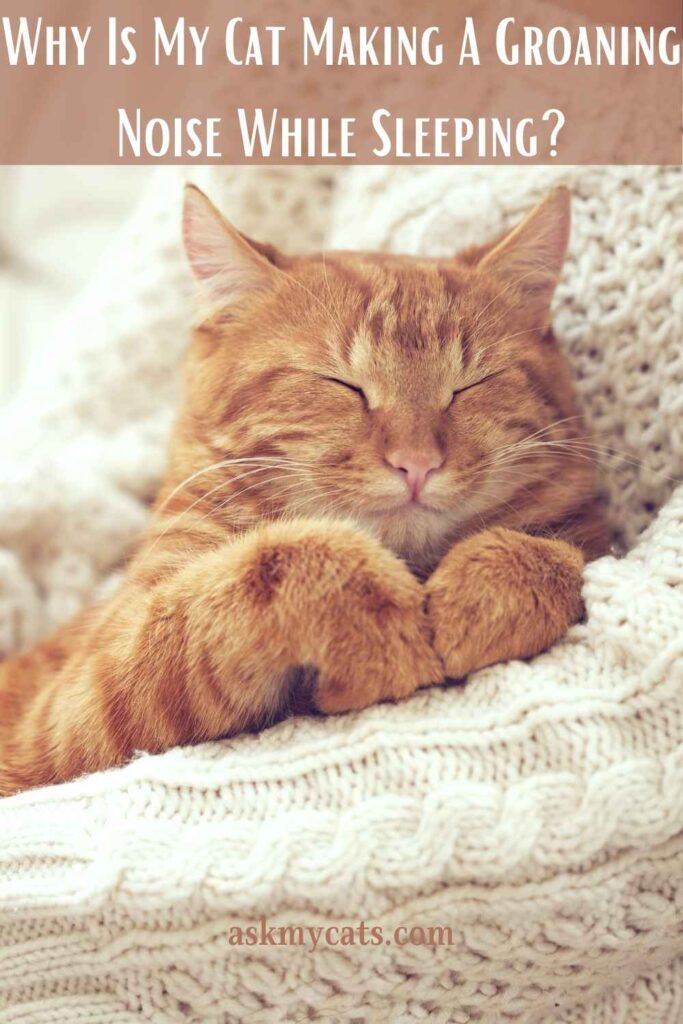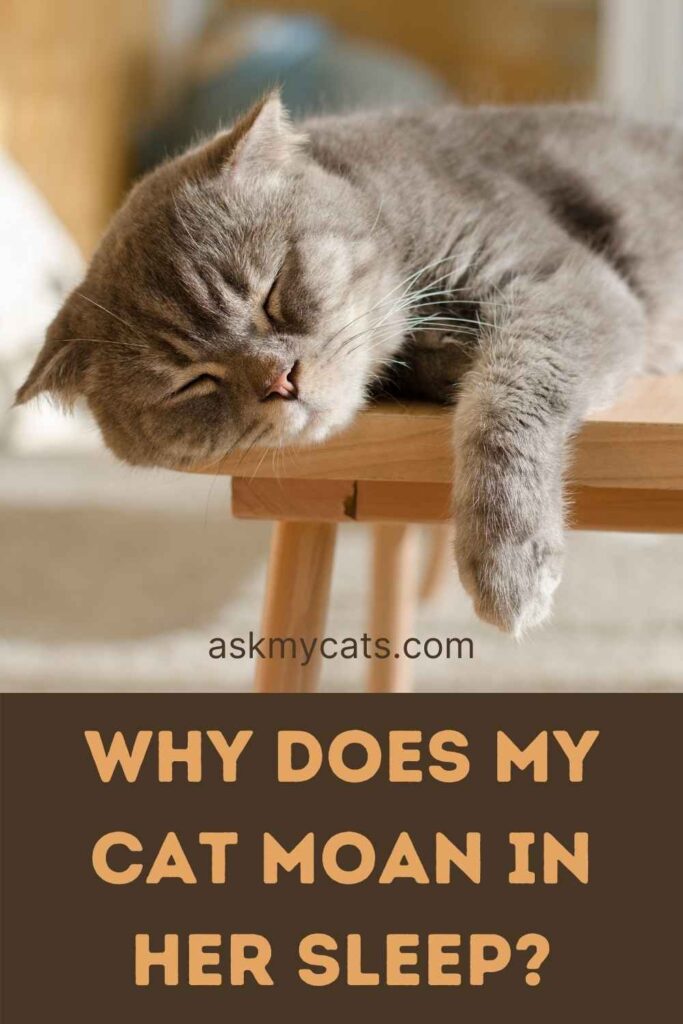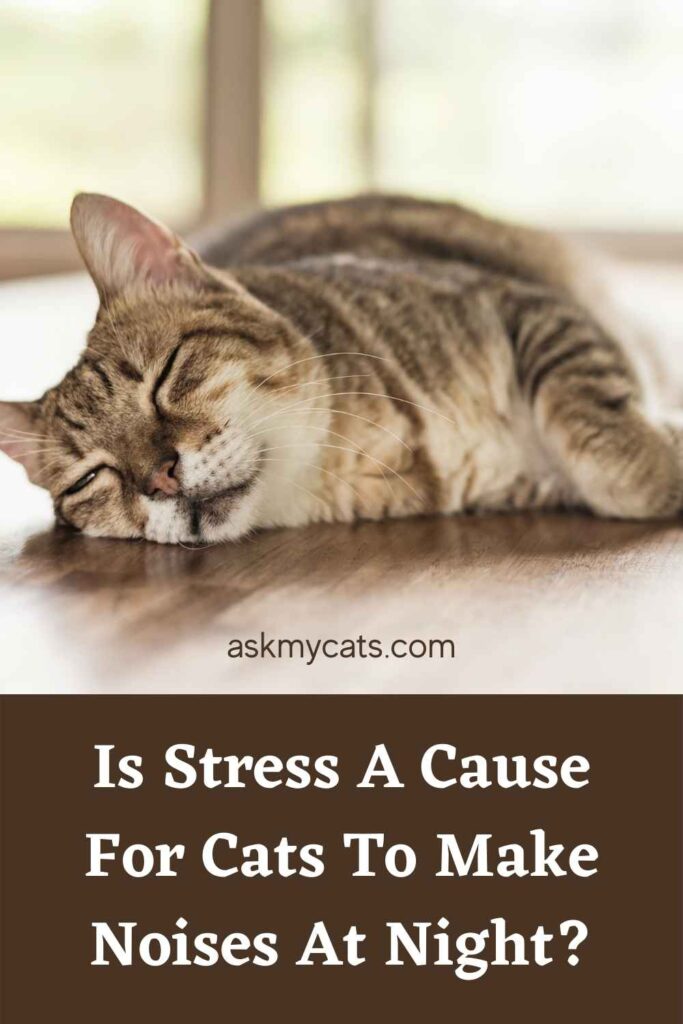Your cat is making groaning noise while sleeping because they are dreaming.
They make sounds, twitch, raise their tails, hands, whiskers, and yeah, they whine, groan, and whimper in their dreams, all guided by the substance and movement in this deep sleep state.
During his waking hours, I’m sure your cat is happy. There’s nothing to be concerned with.
She seems to be having a nice time in her sleep as well. She’s most likely dreaming.
If she is well and nothing about her has changed, tell the doctor, but she is most likely chasing birds in her sleep.


Give Your Cat the Perfect Day
Get the Free Ebook!
Why Is My Cat Making A Groaning Noise While Sleeping?
Cats emit a variety of strange sounds when they sleep because they dream about various things in their subconscious minds.
They purr, chirp, and make an odd sound that defies explanation every now and then. It sounds like a cross between a yowl and a moan, but it’s more cat-like. It’s a melodramatic, drawn-out moan. Caterwauling is the term for this.
There are a variety of explanations why your cat could make this odd and often frightening noise. Here are some of the most common causes of your cat’s caterwauling.

1. They Are In Pain
Caterwauling is no exception to the rule that domestic cats produce noises to communicate with their humans. If your cat suddenly starts making caterwauling sounds, it’s likely that they’re in distress.
It’s impossible to determine whether your pet is in distress, so if they’re caterwauling following a physical wound or injury, it’s time to take them to the veterinarian.
Other painful issues, such as thyroid or kidney disease, can cause cats to caterwaul. Any of these are critical problems that can be addressed by a veterinarian.
2. They Want Your Attention
If your cat doesn’t feel like they’re having enough attention, they’ll make sure you remember.
Caterwauling is misunderstood as melodramatic because it can be melodramatic — the cat is being neglected because they’re fed up!
If you suspect your cat is caterwauling to get pets, treats or other forms of affection, don’t give in and give them what they want as they yowl at you. Do not reinforce the action until you are familiar with your cat caterwauling if they want something.
Instead, schedule routine playtime and one-on-one treatment for your cat so they don’t feel compelled to caterwaul.
3. They Are Ready To Breed
If your cat is in heat, they’ll let prospective mates know by making a caterwaul, which is a literal mating call.
Unless you’re a cat breeder, you really don’t want to breed your cat. Spaying or neutering your pet is the only way to prevent this form of caterwauling, as well as the cat overpopulation issue.
4. They’re Acting Territorial
Cats can be fiercely aggressive, and if they see anything they don’t want on their territory, they’ll let you know.
Cats will also caterwaul if they see another cat from the window, birds they can’t catch, or some such unwelcome intruder.
5. They’re Stressed Out
Caterwauling can occur if your cat is feeling especially vulnerable or suffers from separation anxiety.
Separation distress can be caused by a variety of factors and learning how to relax your cat can help reduce yowling and weeping.
If you get a new pet, have visitors visiting, or have recently relocated, your cat may caterwaul to let you know that their anxiety is rising.
6. They Are Disoriented
Cats’ mental faculties will deteriorate as they grow older. Cognitive dysfunction in cats is fairly common, particularly in senior cats, and it can be a traumatic experience for your cat.
When your older cat begins to caterwaul, contact your veterinarian to see if they are suffering from dementia or some type of cognitive disorder.
Also, check out why does my cat grunt
Why Does My Cat Moan In Her Sleep?
Your cat must be moaning in sleep because it is the sound of his snoring. If your significant other’s snores can offend you, a cat’s snore is downright adorable.

The soft palate will soften while cats are in a deep sleep and totally comfortable, allowing the cat to emit small snore-like noises. It’s nothing to be concerned about; instead, it indicates that your cat is sound asleep.
An idle cat is much more likely to nap than one that has plenty to do. If she is bored, she can sleep more than she wants to, resulting in flabby muscles and weight gain.
A climbing cat tree, a few games, and contact with you can make your cat stay awake for longer periods of time.
Cats are adaptable, which is one of the reasons they’re such a common pet. If you are busier at different times of the day, your cat will adjust her behavior and sleeping patterns to match yours.
You might catch her snoozing next to you, but she’ll be able to wake up and communicate with you as soon as the time is right.
If this happens, don’t feel bad about it; instead, enjoy her business.
Although most cats like to sleep in a safe, enclosed space, they can nap anywhere and at any time. My two cats like to sleep in luxury and prefer a fluffy blanket or cat bed, but on a hot day, it’s not uncommon to see them stretching out on the cold tile in the kitchen.
Few cats like to sleep in bathtubs. Kittens have been seen sleeping in shoes, boots, and purses. A sleepy cat will sleep anytime and at any moment.
If your cat seems to be asleep while the rest of the house is up, she is most likely not sleeping. She’s either snoozing or taking a cat nap.
If you look carefully, you can see her twitch her ears in response to a noise or open one eye a slit as someone passes by. She’s conserving energy even though she’s not sleeping.
The majority of cat owners refer to their cats as nocturnal, meaning they are alive and busy at night. Cats are crepuscular by birth, which means they are busier at night than we are. This suggests that at dawn and dusk, they are more awake and engaged.
During the day and at night, they sleep more (and more deeply), but at dawn and dusk, they’re alert, busy, and chasing the mouse or favorite toy.
Cats are swift, powerful, and use a lot of energy while they are busy, whether they are hunting (for real or pretend) or playing. A cat is one of the few animals that can go from total relaxation to full-fledged running in just a few heartbeats.
These quick motions, though, take a lot of energy and can’t be sustained for long. The cat’s energy stores are replenished by sleeping.
Why Is My Cat Whining In Her Sleep?
During the nighttime, cats can be very chatty. When they’re happy, they’ll purr and meow; when they’re excited, they’ll chirp; and when they’re mad, they’ll hiss.
But it’s at night that they’re especially busy, with no care for disturbing your beauty sleep.
Experts disagree about how many hours most cats sleep a day. Some people say they sleep 12 to 16 hours a day, while others say they sleep up to 20 hours a day.
Of course, each cat has her own schedule, and the amount of sleep she gets is determined by her other activities.
However, a decent daily average is about 16 hours. In comparison, we only get 7 or 8 hours of sleep a day. Cats had it all figured out!
Kittens are both busier and sleep more than adult cats. When kittens are up, they play quickly and hard before sleeping comfortably.
Adult cats can be awake but only observe their surroundings, conserving energy rather than using it, and hence need less sleep than kittens.
Geriatric cats, those in their mid-to-late twenties, sleep for longer periods of time per day than younger adult cats. A newborn kitten and an elderly cat, especially one with health problems, can both sleep for up to 22 hours per day.
You could have seen a kitten’s paws twitch or tail lash around while watching her sleep and wondered what sort of fantasy a kitten with no life experience may have.
It’s probable the kitten was dreaming, but the more plausible explanation is that the kitten was experiencing triggered sleep.
The kitten will kick, jerk, shift her legs, tail, torso, and head during this form of sleep, and she can scream or whimper.
When she sleeps, these movements help her gain muscle strength. This form of sleep is normal and safe in kittens, but it disappears as the kitten grows older. If you see an adult cat kicking and meowing, she’s dreaming.
Cats are crepuscular, meaning they are most active between the hours of dusk and dawn. Rats, you know, are wired to be more aggressive at night.
Snakes, rats, rodents, and other small creatures that cats eat in the wild are normally up and running at this time which makes them easy to catch for the cat.
It’s how wild cats have managed to thrive for millennia. To put it another way, the pet is actually doing what he or she knows how to do.
It’s possible that your indoor female cat has gone into heat and is desperate to find a mate if she starts meowing at night. To avoid this night-time practice, it’s a smart idea to get your cat spayed as soon as possible.
Is Stress A Cause For Cats To Make Noises At Night?
Cats are more likely to make strange sounds because they are overwhelmed at night.
Cats, as you already remember, are vulnerable to tension, and it doesn’t take anything to throw them off. The following are some of the more important stressors:

When you move home, your cat will become more verbal. Your pet can become disoriented, confused, and stressed in a new setting.
Changes in routine – Cats thrive on routine, and even the tiniest deviation from it will cause them stress.
If we feed our cat later than normal or go away from home for an extended period of time, it would act differently.
A cat’s meowing or yowling in the middle of the night is its way of informing you that it is stressed.
Bringing a new addition to the family – Adding a new member to the family, whether it’s a new infant or another pet, is one of the most stressful events for cats.
Furthermore, anytime a new infant or pet comes, there is normally a shift in schedule, which means your kitty is much more nervous than normal.
It’s not uncommon to hear a cat meow about the time of breakfast or dinner. And it probably doesn’t feel that noisy in the middle of the day.
When a cat screams to let you know it’s starving at 4 a.m., though, it sounds like a foghorn. It’s possible that your cat’s strange sounds are due to hunger or thirst.
Make sure there is plenty of water and maybe some food available before going to bed.
What is Feline Cognitive Dysfunction Syndrome?
Feline cognitive dysfunction (FCD) is a neurological condition that affects cats and is caused by aging of the brain.
It causes improvements in perception, understanding, and memory deficits, and reduced responsiveness to stimuli.
Most cats suffer from Cognitive Dysfunction Syndrome, also known as FCD (Feline Cognitive Dysfunction).
While Cognitive Dysfunction Syndrome is more common in older cats, it does not rule out the possibility of it affecting younger cats.
Cats in their senior years are most likely to be diagnosed with CDS. CDS, like all feline illnesses, is impossible to diagnose. The signs and symptoms are similar to those of other feline diseases.
CDS is notoriously difficult to detect due to its origin. Many symptoms are something we’d chalk up to cats being cats, such as if your feline pal seems to be confused or roaming.
On the floor, the cat seems to be just another cat; but, the cat may have CDS. Abnormal vocalizing, a sense of being lost, and general disorientation are all symptoms of CDS.
If the partner is vocalizing abnormally, this is a characteristic of CDS that is likely to be more apparent.
Domesticated cats that have spent a significant amount of time with their owners normally realize that as night falls, it is time to relax in the same way as their managers.
If your cat has CDS, though, they’re more apt to make strange vocal noises in the middle of the night. This is almost certainly the cause of your cat’s strange nighttime noises.
Another way to tell if your pet has CDS is if they are unable to use their litter box properly. House training seems to come naturally to cats; but, with CDS, the cat forgets where the litter box is, and house training is effectively abandoned.
The problem isn’t because they’ve forgotten how to use a litter box. The problem is that they forget where the litter box is, which causes the cat to become disoriented.
Limit your cat’s proximity to stairs or some areas of the house if he becomes disoriented. Keep doors shut so he doesn’t go into the closet, behind the toilet, or somewhere else where he may be trapped.
Frequently Asked Questions
Is it normal for cats to make noises while sleeping?
You can find your cat twitching, stretching, snoring, or even making odd squeaking sounds when they are asleep. It’s normally nothing to worry about since they’re just symptoms of REM sleep.
Is it bad if I can hear my cat breathing?
Cats with loud breathing can be seen by a doctor as soon as possible to rule out or detect potentially dangerous medical problems. Without the use of veterinary instruments, this involves breathing that can be easily heard. Wheezing, snoring, or squeaking is also examples of noisy breathing.
Final Words
You could be in agony if your cat makes caterwauling sounds out of nowhere.
It can be impossible to determine whether your pet is painful, but after physical trauma or disease, it may be an indication that the veterinarian must be seen.
Drop down your questions in the comments section below!
